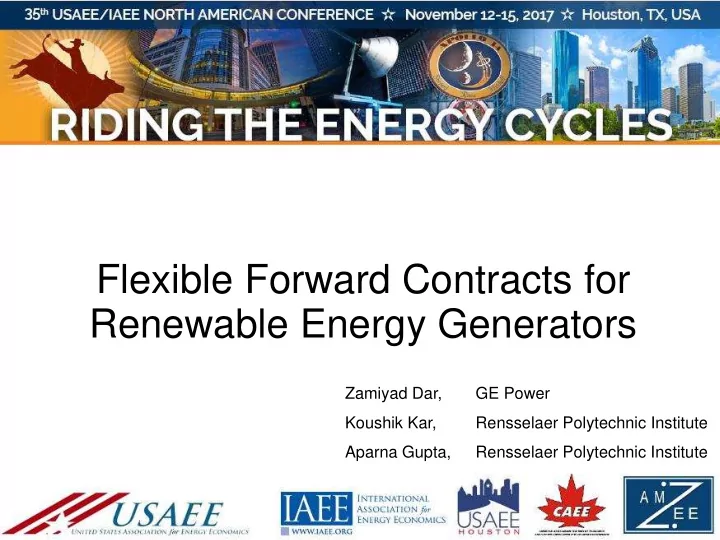

Flexible Forward Contracts for Renewable Energy Generators Zamiyad Dar, GE Power Koushik Kar, Rensselaer Polytechnic Institute Aparna Gupta, Rensselaer Polytechnic Institute
Wind power is variable: Can we have insurance against this variability in wind power? • Variability in renewable resource output • Prevents renewable resources to engage in day ahead and forward contracts • Generation owners exposed to real time price fluctuations Day ahead contract would impose firm power delivery Real time price obligation for the windfarm fluctuations
Flexible Forward Contract: If purchasers are flexible with their load demand they get to pay a lower price… • Utilizing the time and demand flexibility of flexible loads • Forward contract with built-in flexibility • Permit deviation from committed amount • Constraints on total served energy • Lower than day ahead market price for flexible load • Agreed deductible when partial failure to fulfill the obligation A flexible forward contract between • Windfarm’s variability renewable resource and flexible load • Aggregator's flexibility Purchaser’s price • Flexible forward contract Wind plant risk • Reduced price
Allowing flexibility with some bounds.. Agreed price Real time price Available quantity Agreed quantity Contracted amount Accurate forecast of real time Flexibility price will benefit the supplier to improve its payoff Minimum service
Don’t take advantage of this leniency! Make me a better offer I don’t need more than my ability to consume Don’t oversupply at different intervals Fulfil some energy obligation at different intervals
Are there any value propositions for each stakeholder? Renewable Resource Aggregator / Flexible Load ✓ Insurance against uncertain wind and real ✓ Lower price than day ahead market price time price spikes ✓ Fulfilling energy demand from renewable ✓ Flexibility to deviate from committed resources uncertain generation / forecast ✓ Improve RPS requirements if any ✓ Can make a more aggressive forward bid × Loss of certainty about available power ✓ Opportunity to take advantage of real time price spikes System operator ✓ Reduces requirement to schedule demand response or call reserves due to renewable resource unavailability (self scheduling) ✓ Potential improvement in system renewable generation portfolio ✓ Lower cycling of conventional generators ✓ No significant changes required in most present market rules and regulations
Contract setup • Base case of 500 cars • Arrival (5:00 PM to 9:00 PM) • Some require 75% charge • Some require 50% charge • Try different number of cars (400 – 600) • Different levels of flexibility (0 to 9 hours) • An average power supply rate of 10 kW • An average battery capacity of 50 kW-hr Assume transaction price is equal to day ahead price for comparison purpose
Analyzing the available flexibility Each car charges to 100% of its capacity in 5 hours at maximum power supply rate
How much impact can price forecasting have? Using accurate forecast allows the supplier to dispatch optimally between the forward contract and spot market Revenue in $/MW of capacity when Revenue in $/MW of capacity when forecast of real time price is used actual value of real time price is used
More flexibility might permit the supplier to serve a higher load With no flexibility, revenues might decrease as load increases (may have to fill the void in spot market) Revenue in $/MW of capacity when Revenue in $/MW of capacity when forecast of real time price is used actual value of real time price is used
Art of the deal: An example of negotiated transaction price • 3 hours of flexibility in the load • Flexible load will not agree to pay more than the minimum it would pay under day ahead market price • Contract price for the three highest priced hour were set lower than the three lowest priced hour in day ahead market Renewable resource makes more Load pays a lower price
Conclusion and future possibilities ✓ Proposing a flexible forward contract for renewable resources with variable power to participate in forward markets ✓ Despite lower transaction price, renewable resources can take advantage of real time price spikes by utilizing the flexibility in the contract ✓ Flexible loads end up paying lower amounts than they would under the day ahead market prices ✓ Higher the flexibility, higher the benefit to the renewable resource ? How to efficiently aggregate multiple flexible loads while keeping the actual flexibility and demand requirement? ? How to set the transaction price? ? Is there an optimal combination of flexible contract and fixed contract that windfarm can undertake?
Recommend
More recommend